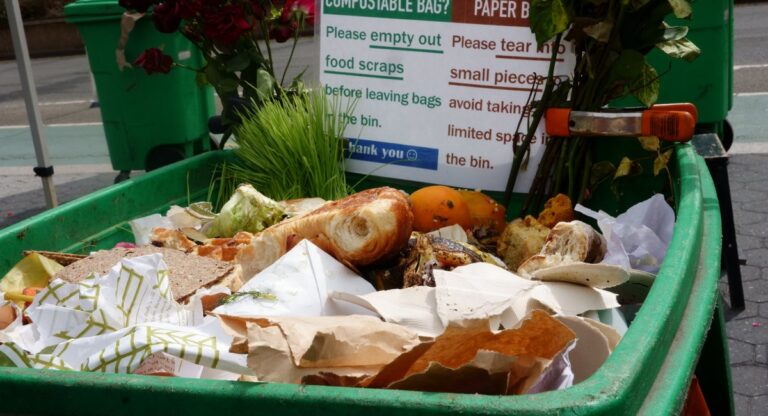New Yorkers are wondering what to do with their organic waste as the number of curbside composting facilities dwindles across the five boroughs.
The nonprofit GrowNYC closed its community composting facility at the Fort Greene Farmers Market on Saturday, leaving residents wondering what they would do without the service that has operated for years in Fort Greene Park between Myrtle and Willoughby streets. I let her hold me.
The Fort Greene site was one of many locations GrowNYC closed in the past few weeks after Mayor Eric Adams eliminated city subsidies for community composting programs in budget cuts announced last year. . The city announced $3 million in cuts to its composting program last November, but reversed some of those cuts in January.
Although the city is rolling out a universal curbside collection program, the service is still only available in Brooklyn and Queens. Proponents of community composting argue that their programs are already established in communities and are helping educate New Yorkers about how composting works.
In December, an anonymous donor donated an undisclosed amount to GrowNYC, allowing the nonprofit to continue its community composting operations through the winter and spring. The group announced on its website that it will close services at most of its composting facilities by May 20, and will lay off more than 60 employees from its compost program as a result.
Without a community-based location like Fort Greenes, many captive composters expressed concerns about how they would dispose of food scraps and other garbage.
“When we moved into our apartment, we had the impression that it was just being thrown into a regular trash can by building maintenance personnel, so there was a lack of trust that it was in the right place. ” said the Fort Greene resident. Gwen Aliega.
She decided to start dumping compost at the park in 2020 and has been doing it every Saturday since.
Misha Abrek, another Fort Greene resident who has been composting for about five years, said the Grow New York City site is the only easily accessible compost dump in the area. Since he doesn’t have anything local, he said he plans to take his waste to the Union Square Farmers Market, which has a community compost site operated by the Lower East Side Ecology Center.
But he acknowledged that not all neighbors have the same privileges.
“It’s probably inconvenient for everyone to go to Union Square or anywhere else where this is still available,” he said.
Union Square will operate a composting site Monday, Wednesday, Friday, and Saturday from 8 a.m. to 5 p.m. The Lower East Side Ecology Center will also operate in Tompkins Square Park on Sundays from 8 a.m. to 5 p.m.
Nathalie Huang is GrowNYC’s Compost Coordinator and worked at locations across Brooklyn. She said residents were in shock the last day she collected compost in the community.
“Many of my participants live in apartment buildings whose buildings do not participate in the curbside program, and various barriers prevent their participation,” she said.
Mr. Huang, Mr. Aliega, and Mr. Abrek all expressed concern about the availability of curbside composting in multifamily buildings, but New York City law requires that all residences in Brooklyn and Queens must dispose of organic waste elsewhere. It is necessary to separate it from other garbage.
However, until spring 2025, the City Sanitation Department can only issue warnings to buildings that do not comply with the law.
In the meantime, “residents who want to compost but find it difficult to do so because of large buildings should remind their property owners,” Sanitation Department spokesman Joshua Goodman said in a statement. It’s good for the environment, it fights rats, it’s easy, and it’s the law.”

